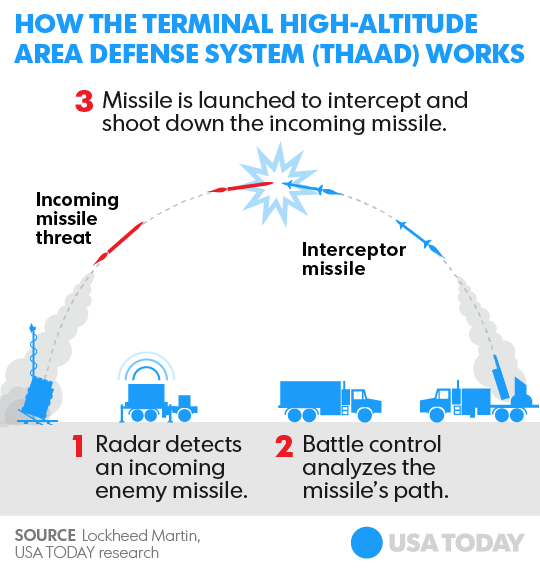U.S. moves missile defense to South Korea

The United States moved missile launchers and other military hardware needed to set up an anti-missile defense system in South Korea, the U.S. Pacific Command said Tuesday. The move comes a day after North Korea test-launched four ballistic missiles into the ocean near Japan.
The U.S. military said in a statement that the deployment of the Terminal High-Altitude Area Defense system, or THAAD, in South Korea was intended to intercept and destroy short- and medium-range ballistic missiles.
Still, while the U.S. and South Korea said the system is purely defensive, the action is likely to anger not only North Korea, but also China and Russia, which see the system’s powerful radars as a security threat.
A Chinese Foreign Ministry spokesman reacted in a regularly scheduled briefing by saying China would take unspecified measures. Geng Shuang warned the U.S. and South Korea that there would be "consequences."
“Continued provocative actions by North Korea, to include yesterday’s launch of multiple missiles, only confirm the prudence of our alliance decision last year to deploy THAAD to South Korea,” Adm. Harry Harris, head of the U.S. Pacific Command, said in its statement.
READ MORE:
Reports: N. Korea fires projectiles off eastern coast

North Korea on Monday fired four ballistic missiles in an apparent protest against ongoing U.S.-South Korean military drills that it views as an invasion rehearsal. The missiles landed in waters that Japan claims as its exclusive economic zone.
North Korean state media on Tuesday said leader Kim Jong Un supervised the drills and that the aim of the exercise was to prove that its artillery units were capable of striking "U.S. imperialist aggressor forces in Japan," according to the Korean Central News Agency.
Kim "ordered the KPA (Korean People’s Army) Strategic Force to keep highly alert as required by the grim situation in which an actual war may break out anytime," KCNA said.
President Trump discussed North Korea's missile launches separately with Japanese Prime Minister Shinzo Abe and South Korea's Acting President Hwang Kyo-Ahn during a phone call late Monday.
"Japan and the U.S. confirmed that the latest North Korean missile launches were clearly against U.N. resolutions and a clear provocation against the regional and international community," Abe later told reporters. "(North Korea's) threat has entered a new phase."
